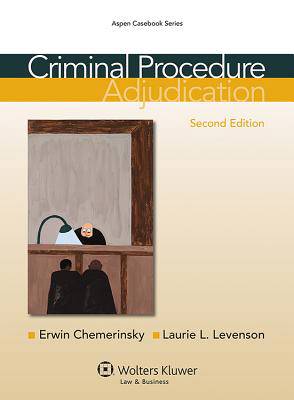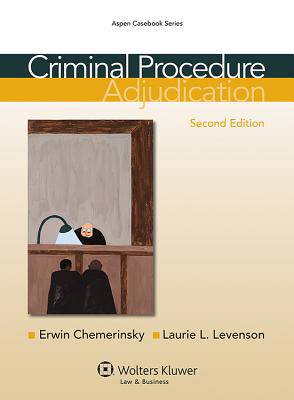
Door een staking bij bpost kan je online bestelling op dit moment iets langer onderweg zijn dan voorzien. Dringend iets nodig? Onze winkels ontvangen jou met open armen!
- Afhalen na 1 uur in een winkel met voorraad
- Gratis thuislevering in België vanaf € 30
- Ruim aanbod met 7 miljoen producten
Door een staking bij bpost kan je online bestelling op dit moment iets langer onderweg zijn dan voorzien. Dringend iets nodig? Onze winkels ontvangen jou met open armen!
- Afhalen na 1 uur in een winkel met voorraad
- Gratis thuislevering in België vanaf € 30
- Ruim aanbod met 7 miljoen producten
Zoeken
€ 342,95
+ 685 punten
Omschrijving
Written in the student-friendly style that characterizes Chemerinsky's Constitutional Law casebook, Criminal Procedure: Adjudication features cases, minor cases, and author-written essays while omitting both notes in the form of rhetorical questions and excerpts from law review articles. The chronological organization moves through the criminal justice process, from investigation to habeas corpus. Dynamic text guides students through understanding the law with tightly edited cases, samples of legal pleadings arguing the issues, and perspectives from prosecutors, defense, counsel, judges, police, and victims alike. Each chapter has a consistent, systematic approach, beginning with an introduction laying out the nature of the issue, followed by a discussion on the history and development of the law. Then, examples of recent and seminal cases reveal how key criminal procedure issues have been raised, and an analytic approach toward resolving each issue shows what worked and why.Examination of new decisions' effects
The Second Edition has been thoroughly updated and provides analysis of the impact of important recent decisions, such as Arizona v. Gant, Herring v. U.S., Berghuis v. Thompkins, Maryland v. Shatzer, Montejo v. Louisiana, and Perry v. New Hampshire. In addition, the Second Edition examines new decisions affecting right to counsel. New supplemental handouts and practice materials are available on the companion website.
Features:
- Written in the approachable style of Chemerinsky's Constitutional Law casebook
- features cases and minor cases
- offers author-written essays
- omits both notes in the form of rhetorical questions and excerpts from law review articles
- Organized chronologically through the adjudication process
- Dynamic text guides students through understanding the law
- tightly edited cases
- samples of legal pleadings arguing the issues
- perspectives from prosecutors, defense, counsel, judges, police, and victims
- Consistent systematic approach to topics in each chapter
- an introduction laying out the nature of the issue
- discussion of the history and development of the law
- examples of recent and seminal cases that raise key criminal procedure issues
- analytic approach toward resolving a specific legal issue--what worked and why
- questions--and answers--to provoke class discussion
Thoroughly updated, the revised Second Edition presents:
- Analysis of the impact of recent decisions
- Missouri v. Frye
- Lafler v. Cooper
- Skilling v. United States
- Michigan v. Bryant
- Bullcoming v. New Mexico
- Williams v. Illinois
- Graham v. Florida
- Miller v. Alabama
- right to fair trial
- habeas corpus law
Specificaties
Betrokkenen
- Auteur(s):
- Uitgeverij:
Inhoud
- Aantal bladzijden:
- 503
- Taal:
- Engels
- Reeks:
Eigenschappen
- Productcode (EAN):
- 9781454807124
- Verschijningsdatum:
- 29/07/2013
- Uitvoering:
- Paperback
- Formaat:
- Trade paperback (VS)
- Afmetingen:
- 203 mm x 254 mm
- Gewicht:
- 1433 g

Alleen bij Standaard Boekhandel
+ 685 punten op je klantenkaart van Standaard Boekhandel
Beoordelingen
We publiceren alleen reviews die voldoen aan de voorwaarden voor reviews. Bekijk onze voorwaarden voor reviews.











